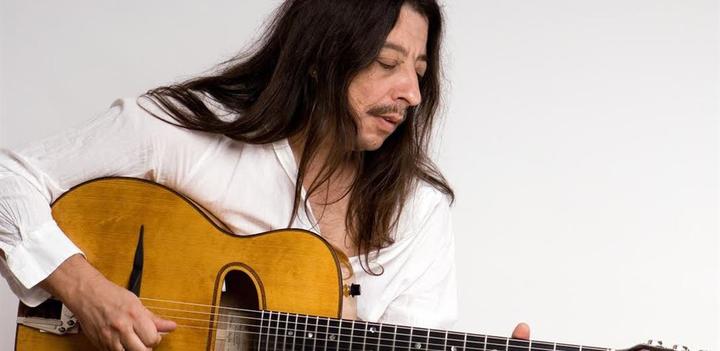Harri Stojka: guitar
Wolfgang Schmidt: keyboards
Peter Strutzenberger: bass
Claudius Jelinek: rhythm guitar
Sigi Meier: drums
Harri Stojka is a guitarist, singer, composer and arranger from Vienna. He is a Roma and is one of the key contemporary jazz musicians in Austria.
Harri was born in Vienna in 1957. The Stojka family are Lovara-Roma, a tribe that emigrated from Hungary and Slovakis in the second half of the 19th Century to what is Austria today. A large part of his family were victims of World War II. Only six of the original 200-plus members of the extended family survived the terror of the Nazi regime, including his father Johann Mongo Stojka.
Father Johann Mongo, who was also a musician, gave his six-year-old son a plastic guitar that he brought back from a fête. The guitar fascinated young Harri so much that he ended up getting a real instrument shortly thereafter. There is a funny family story related to this: after buying the guitar, his father told little Harri, “You have to practise so long until your fingers start smoking!” After practising for quite a while, Harri said to his father, “Papa, I practise and practise, but no smoke comes out!”
Harri grew up amidst a wide variety of musical influences. Besides the traditional Roma songs where were sung at festivities, the Stojka family listened to the music of Elvis Presley, Frank Sinatra, the Beatles and American soul. Young Harri was particularly fond of George Harrison, who at that time was his great idol. Later, bebop and jazz came into the mix that left their impression on the young guitarist: Charlie Parker, George Benson, Pat Martino, Joe Pass, Karl Ratzer and especially gypsy jazz legend Django Reinhardt, whom Harri Stojka regarded as the greatest guitar genius of all time.
Harri Stojka’s career as a professional musician began back in 1970 with the Jano & Harri Stojka group, which he founded while still a teenager with his cousin. After playing in various bands as a guitarist and bass player, he founded Harri Stojka Express in 1973. The band played mostly jazz-funk and released their first LP “Sweet Vienna” in 1978, which was followed up by the album “...of the Bone” in 1980. In the following year, Harri Stojka appeared at the “Guitar Summit” held at the renowned Montreux Jazz Festival, where he overwhelmed both critics and audience alike. His appearance was legendary, launching him to international fame. The concert was recorded, by the way, and can be heard on “Live at Montreux”.
Apart from his work as a jazz musician, Harri Stojka has been increasingly involved since the mid-1990s in various projects featuring Roma music and particularly its fusion with other styles of music. Many of his releases have a whiff of world music about them and are often defined as “gypsysoul”.
One of the projects is called Gitancoeur in which Harri Stojka and other top musicians including singer Jelena Krstic, combine songs from the rich treasure of traditional Roma culture with elements of contemporary music styles. He has released three CDs with Gitancoeur up to now, the latest being the album “Gitancoeur d’Europe”, which came out in 2011.
Another project is “Gypsysoul” with which Harry Stojka brought out the album “Garude Apsa” in 2005. Garude apsa is Romani for ‘hidden tears’. In this project, Harri Stojka commemorates the liberation from the Nazi regime and its victims. The album is to be a reminder of the musical roots of the Roma and to give today’s generation, the children and grandchildren of those who survived, pride and courage to face the future - in a Europe that in its culture and music became a reality long before an understanding of a European union could come about with other peoples – says the musician.
Harri Stojka India Express is another of the musician’s projects. He and violinist Mosa Sisic went on a journey to their musical roots. Part jazz, with which he began his career, and part Indian, as the country where his ancestors originated. This resulted in a musical world tour from Rajasthan through Southeast Europe to Paris and on to Louisiana. The project was also made into a film. Five weeks long, Austrian filmmaker Klaus Hundsbichler and his crew accompanied Harry Stojka and Mosa Simic (who is also a Roma) on the search for their roots in India. The film received a ROMY in the category of “Best Cinema Documentary 2011”.
Besides the projects mentioned above, Harri Stojka is still as active as ever as a jazz and swing musician. In 2004, he released the recording “A Tribute to Swing” as a reminiscence to the classic European gypsy swing of the 1930s and 1940s. The album was nominated for the German Music Critics Prize and also in Germany for the Echo Prize for “Best Foreign CD Production” in 2005. Likewise in 2005, Harri Stojka was awarded best musician in the category of “Jazz National” by the Austrian music magazine Concerto. His most recent releases are the two albums “Heavy Stuff” and “Hot Club de Vienne” which came out in 2014.
Aside from his activities as a musician, Harri Stojka is engaged in various cultural-historical, social and political projects. In 2012, for example, he and the Gipsy Music Association launched a photography campaign “Ich bin gegen das Wort Zigeuner” (I’m against the word ‘gypsy’). The campaign was directed against the use of this derogatory and discriminating term and was supported by a number of prominent figures. The campaign got wide media coverage in both Austria and abroad. For his dedication, Harri Stojka was also awarded the Decoration of Honour in Gold for services to the Republic of Austria in 2013. Harri Stojka regularly organises workshops, mostly on the topic of gypsy jazz und Roma music.
Harri Stojka gives a wide variety of concerts around the world. He plays and has played at major jazz and world music festivals and also performs many gigs in clubs.
